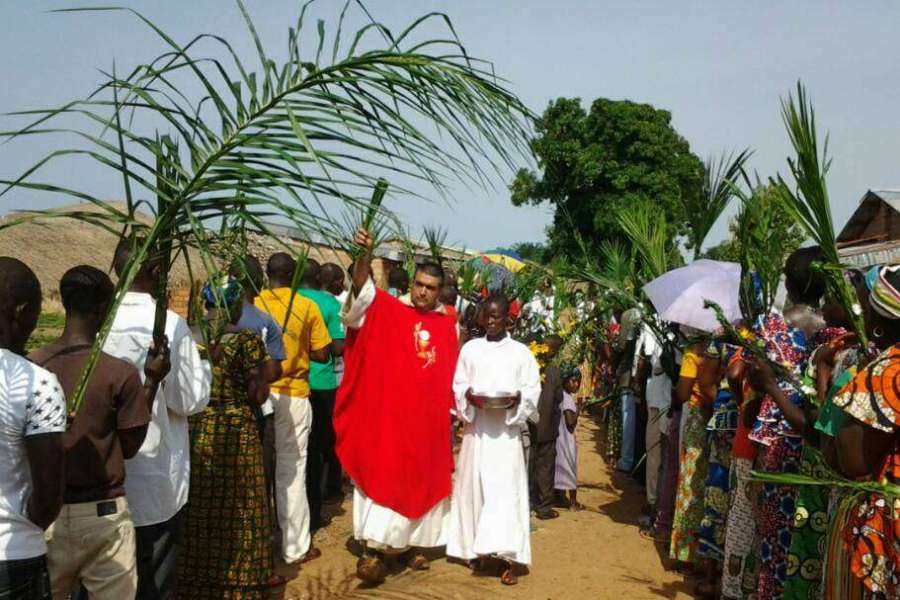Especially in war-torn Central African Republic, Christians are called to the virtues of forgiveness and mercy, reflected a priest from Chile who has spent 12 years as a missionary in the central African country. “Being a Christian in the Central African Republic means witnessing to the forgiveness and mercy of God,” Fr. Yovane Cox told ACI Prensa.
The Central African Republic has suffered violence since December 2012, when several bands of mainly Muslim rebel groups formed an alliance, taking the name Seleka. They left their strongholds in the north of the country and made their way south, seizing power from then-president Francois Bozize. Their president was in turn ousted in a negotiated transition in January 2014.
In reaction to the Seleka's attacks, some Central Africans formed self-defense groups called anti-balaka. Some of these groups, mainly composed of Christians, began attacking Muslims out of revenge, and the conflict took on a sectarian character. The civil war has officially ended and the Seleka have been disbanded, but ex-Seleka and anti-balaka groups have continued to terrorize local populations. Thousands of people have been killed in the violence, and hundreds of thousands displaced from their homes.
Fr. Cox is a pastor in Bema, near Bangassou in the country's southeast. In the context of the Central African Republic's extreme poverty, the Chilean missionary of the Gran Rio Mission Association has managed to build a school for 300 children and hopes to build another with the capacity for 400 students.
Fr. Cox said the sectarian violence urgently calls for “showing mercy” and to “being ready to forgive, to help people to overcome terrible things such as death of a loved one or the destruction of their village.”
The priest related his own experience of persecution and violence when in June this year he had to flee, along with his faithful, to the Democratic Republic of the Congo to seek refuge. “I was lying on the floor of the church for hours waiting for the fighting to end. Then I left and came across some extremely angry people, so I asked myself, “How can I be a witness to Christ in the midst of this terrible situation?”
“Like every pastor I was the last to leave the village, using a dugout canoe,” Fr. Cox recalled, “and when I got to the other side, to the Congo, I was welcomed by all the people, even by those who were indifferent to me in the village.” “Everyone gave me a hug and told me 'Father, we were waiting for you.' When people say 'father' to you so many times, the meaning of the word is lost sometimes, but there I experienced it. I said to myself 'these are my children, they were waiting for me just like for a father,” the missionary said.
The persecution of Christians in the Central African Republic are undergoing is coming from a mostly Muslim group “which is being politically manipulated,” Fr. Cox said. “There is a hidden political agenda, no one wants to say it, but it's the reality. It does a lot of harm and is dividing the country. Only in the capital, Bangui, thanks to the presence of Pope Francis in 2015, was the Muslim population able to be reconciled with the rest of the citizens.”
The priest also said that the the country's terrain “is extremely rich” thanks to oil and diamonds. Though it has immense natural resources, the country “is mired down in extreme poverty and curiously no international concern or nation is interested in the resources.” “The United Nations is present but they're not doing a good job and they haven't succeeded in defusing this conflict or making progress toward reconciliation. The Church is the only only institution doing something for the people. Africa is suffering from terrible indifference,” from the outside world, he lamented.
Faced with this, Fr. Cox encouraged Catholics to show their solidarity with persecuted Christians in Africa in three ways, beginning with overcoming indifference. “If we don't resolve Africa's problems, how are we going to stop emigration? In face of this indifference the only solution is to open up your heart and recognize that we're all humans beings and we have the same dignity before God and each other,” he stated.
Secondly, concrete actions. “Many people help out by donating to Aid to the Church in Need and they carry out various projects here. But also it can be done on a personal level; for example, I have 60 Chileans who are paying for the tuition for one child for a whole year.”
Finally, but no less important, is prayer: “If we didn't have the prayers of the Church, I think the Church in the Central African Republic would have failed in its missionary work.” “We would have become discouraged and abandoned the people, but there is something that fortifies the soul of all missionaries and that is that we know that we have the support of a lot of people behind us,” Fr. Cox emphasized.

